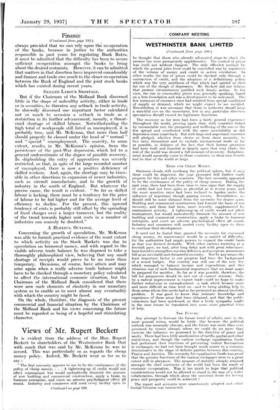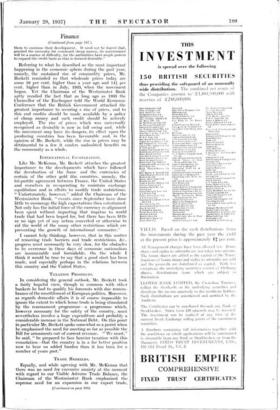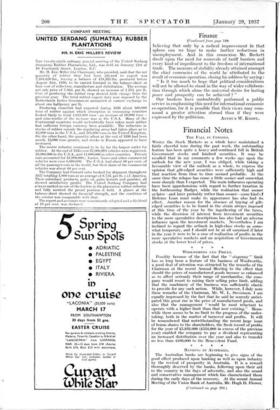Views of Mr. Rupert Beckett
Ii is evident from the address of the Hon. Rupert Beckett to shareholders of the' Westminster Bank that' with much that was said by Mr. McKenna he. was in accord. This was particularly so as regards the cheap money policy. Indeed, Mr. Beekett went so far as to say : " The first necessity appears to me to be the continuance of the policy of cheap money. . . . A tightening-up of credit would not affect rearinajnent but would undoubtedly dicifinish the amount of new building and commercial conetruction, apply a 6r4e_ business enterprise, and exert an-.ficivenie...peYehological ,effe..4 ap„ round. Industry and commerce still need every facility open to Continued on page. 199:
Finance
(Continued front page I97,) them to continue their development. It need not be feared that, granted the necessity for continued cheap money, its maintenance will be a matter of difficulty, for the authorities have ample powers to expand the credit basis as that is deemed desirable."
Referring to what he described as the most important happening in the economic sphere during the past year, namely, the sustained rise of commodity prices, Mr. Beckett reminded us that wholesale prices today are some 10 per cent. higher than a year ago and 14 per cent. higher than in July, 1985, when the movement began. Yet the Chairman of the Westminster Bank aptly recalled the fact that as long ago as 1933 the Chancellor of the Exchequer told the World Economic Conference that the British Government attached the greatest importance to securing a rise of prices, and to this end credits should be made available by a policy of cheap money and such credit should be actively employed. The rise of prices which was universally recognised as desirable is now in full swing and, while the movement may have its dangers, its effect upon the producing countries has been favourable and, in the opinion of Mr. Beckett, while the rise in prices may be detrimental to a few it confers undoubted benefits on the community as a whole.
INTERNATIONAL CO-OPERATION.
Like Mr. McKenna, Mr. Beckett attaches the greatest importance to the developments which have followed the devaluation of the franc and the currencies of certain of the other gold bloc countries, namely, the tri-partite agreement between France, the United States and ourselves in co-operating to maintain exchange equilibrium and in efforts to modify trade restrictions. " Unfortunately, however," added the Chairman of the Westminster Bank, " events since September have done little to encourage the high expectations then entertained. Not only has the initial force of the currency re-alignment been spent without imparting that impetus to world trade that had been hoped for, but there has been little or no sign yet of any action concerted or otherwise to rid the world of the many other restrictions which are preventing the growth of international commerce."
I cannot help thinking, however, that in this matter of removing trade barriers and trade restrictions, &c., progress must necessarily be very slow, for the obstacles to be overcome in these days of economic nationalism are innumerable and formidable. On the whole I think it would be true to say that a good start has been made, and especially perhaps in the relations between this country and the United States.
TAXATION PROSPECTS.
In considering the general outlook, Mr. Beckett took a fairly hopeful view, though in common with othcr bankers he had to qualify his forecasts with due remem- brance of the unsettlement of European politics. Moreover, as regards domestic affairs it is of course impossible to ignore the extent to which home trade is being stimulated by the rearmament programme—a programme which, however necessary for the safety of the country, must nevertheless involve a huge expenditure and probably a considerable increase in the National Debt. On this point in particular Mr. Beckett spoke somewhat as a purist when he emphasised the need for meeting as far as possible the Bill for armaments out of current revenue. " We must," he said, " be prepared to face heavier taxation with this consolation—that the country is in a far better position now to bear an added burden than it has been for a number of years. past."
TRADE BARRIERS.
Equally, and while agreeing with Mr. McKenna that there was no need for excessive anxiety_ at the moment with regard to our Visible Adverse Trade Balance, the Chairman of the. Westminster Bank emphasised the supreme need for an expansion in our export trade, (Continued on page 200)
Finance
(Continued front page 199.
believing that only by a radical improvement in that sphere can we hope to make further reductions in unemployment.. And. in this .connexion. Mr. Beckett dwelt upon the need for removals of tariff barriers and every kind of impediment to the freedom of international trade. The measure of stability already attained amongst the chief currencies of the world he attributed to the result of economic operation, closing his address by saying : " Is it too much to hope that political considerations will not be allowed to stand in the way of wider 'collabora- tion through which alone the universal desire for lasting peace and prosperity can be achieved ? "
Our bankers have undoubtedly performed a public service in emphasising this need for international economic co-operation, for it is possible that their views may com- mand a greater attention abroad than if they were
























































 Previous page
Previous page